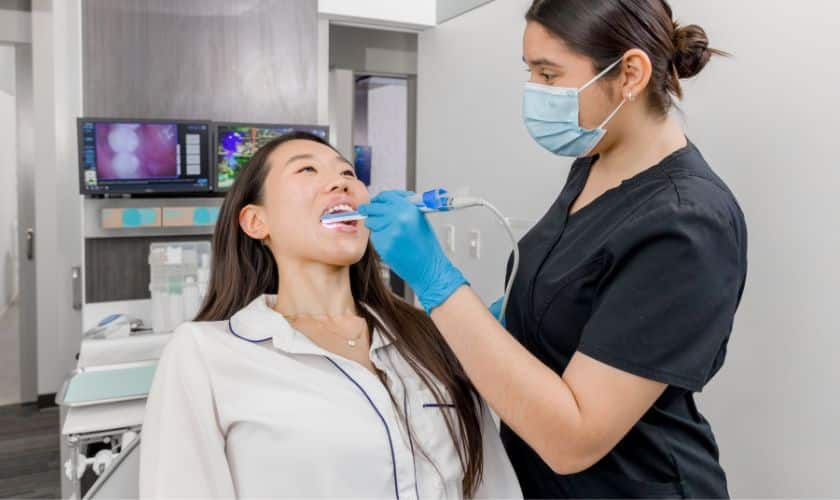Pearl Dental Blog

Is Sedation Dentistry Right for You? Factors to Consider in 2024
In the realm of modern dentistry, the concept of sedation has become a pivotal consideration for many patients seeking dental care. Whether due to anxiety, fear of pain, or the complexity of the procedure, sedation dentistry offers a solution that allows individuals to receive necessary dental treatments comfortably and safely. As we navigate through 2024, understanding the factors involved in deciding whether sedation dentistry is suitable becomes increasingly important. This blog explores the various aspects of sedation dentistry, factors to consider when contemplating this option, and how it can potentially benefit patients.
Understanding Sedation Dentistry
Sedation dentistry involves the use of medications to help patients relax during dental procedures. The levels of sedation can vary from minimal sedation (where the patient is awake but relaxed) to deep sedation (where the patient is on the edge of consciousness but can still be awakened). The types of sedation commonly used include:
- Nitrous Oxide (Laughing Gas): A mild sedative administered through a mask that is placed over the nose. It induces relaxation and wears off quickly after the procedure.
- Oral Sedatives: Pills or liquid medications taken before the procedure to induce a higher level of relaxation. This type of sedation can range from minimal to moderate depending on the dose.
- Intravenous (IV) Sedation: Administered directly into the bloodstream, IV sedation provides a deeper level of sedation and is often used for more complex procedures or for patients with severe anxiety.
- General Anesthesia: The deepest form of sedation, where the patient is completely unconscious. It is typically reserved for extensive procedures or patients with special medical needs.
Factors to Consider
1. Level of Anxiety or Fear
One of the primary reasons patients opt for sedation dentistry is to manage anxiety or fear associated with dental visits. If the thought of going to the dentist causes significant distress or prevents you from seeking necessary dental care, sedation dentistry may be a viable solution. Discuss your anxiety level with your dentist to determine the appropriate type and level of sedation.
2. Type of Procedure
Certain dental procedures can be lengthy or invasive, which may warrant the use of sedation to ensure patient comfort throughout the process. Procedures such as wisdom tooth extraction, root canal therapy, or dental implant placement often benefit from sedation to alleviate discomfort and reduce anxiety.
3. Medical History and Health Conditions
Your overall health and medical history play a crucial role in determining whether sedation dentistry is safe for you. Inform your dentist about any medical conditions, allergies, medications, or supplements you are taking. This information helps them choose the most appropriate sedative and dosage to minimize risks.
4. Cost Considerations
Sedation dentistry may involve additional costs beyond the standard dental procedure. Insurance coverage for sedation varies, so it’s essential to inquire about costs and discuss payment options with your dentist beforehand.
5. Dentist’s Expertise and Accreditation
Ensure that your dentist is trained and experienced in administering sedation. Accreditation from relevant dental associations or certification in sedation dentistry demonstrates their competence in managing sedated patients and ensuring safety during procedures.
6. Recovery and Post-Procedure Care
Depending on the type of sedation used, recovery times can vary. Some forms of sedation may require you to have a companion to drive you home after the procedure. Discuss post-procedure care instructions with your dentist to ensure a smooth recovery process.
Benefits of Sedation Dentistry
- Increased Comfort: Patients experience reduced anxiety and discomfort during procedures.
- Time Efficiency: Complex procedures can often be completed more efficiently under sedation.
- Improved Dental Health: Access to necessary treatments promotes better oral health outcomes in the long term.
Choosing sedation dentistry is a personal decision that depends on individual circumstances, preferences, and medical considerations. As we progress through 2024, advancements in sedation techniques and patient care continue to enhance the safety and effectiveness of these procedures. If fear or anxiety has prevented you from seeking dental treatment, discussing sedation options with your dentist could be a transformative step towards maintaining your oral health.
In conclusion, while sedation dentistry offers numerous benefits, it’s essential to weigh the factors discussed above and consult with a qualified dental professional to determine if it’s the right choice for you in 2024 and beyond. Taking proactive steps towards managing dental anxiety can lead to a healthier smile and improved overall well-being.





